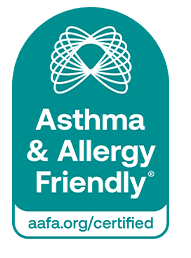Research & Reports
Asthma Capitals
2023 Asthma Capitals: Full Report
The report also discusses risk factors that contribute to these outcomes: poverty, air quality, access to specialist medical care, pollen allergy, medicine use, tobacco policies, and the rate of uninsured residents.
Asthma Peak Month
This year’s report has been released during September to raise awareness of the spike in asthma-related attacks and hospital stays that happen each September. It is known as Asthma Peak Month, or the September Asthma Epidemic. The third week of the month – known as Asthma Peak Week – is often the worst.
People with asthma are exposed to several triggers at once during September, such as:
- Higher ragweed pollen
- Higher mold counts
- The beginning of respiratory illness season
- Poor indoor air quality in schools
- Wildfire-related air pollution
- Extreme weather events and natural disasters, such as hurricanes, heat waves, and extreme thunderstorms
The top 10 most challenging places to live with asthma are:
Report Highlights
It is AAFA’s goal that the 2023 Asthma Capitals report inspires action. Reduced asthma rates and deaths are possible. And this report highlights where we can focus our efforts for healthier environments and communities. This year’s report focuses on three topics related to asthma prevalence and outcomes:
- Reducing health disparities in communities that bear the heaviest burden of asthma
- Taking steps to improve asthma outcomes
- Taking action through advocacy and policy
Reducing Health Disparities in Communities that Bear the Heaviest Burden of Asthma
This report acknowledges that where a person lives can greatly impact their health. Social, economic, and environmental factors play a role in asthma outcomes. Many of the top Asthma Capitals are also facing major challenges and inequities that lead to health disparities.
AAFA’s Health Equity Advancement and Leadership (HEAL) program reinforces AAFA’s commitment to drastically reduce health disparities in communities that bear the heaviest burden of asthma. Through the HEAL program, AAFA provides funding and resources to local pilot programs tailored to at-risk populations most impacted by asthma.
Learn more about health equity and the HEAL program in our report.
Taking Steps to Improve Asthma Outcomes
AAFA is committing our resources to programs and policies with the aim to drastically reduce asthma rates, deaths, and disparities, as well as their impact on people and communities. We urge multiple stakeholders to join us to work together to improve and save lives.
This section outlines ideas for the following stakeholders:
- Federal, state, and local health officials
- Policymakers, legislators, and regulatory agencies
- Health care providers
- People with asthma and caregivers of children with asthma
- Health insurance companies
- Drug (pharmaceutical) companies
Our report outlines ways these stakeholders can improve asthma outcomes. See our report to learn more.
Taking Action Through Advocacy and Policy
Advocacy is a critical part of AAFA’s mission to save lives and reduce the burden of disease for people with asthma, allergies, and related diseases. This year, AAFA is calling on our community to join us in these advocacy efforts – including at the state and local levels.
This report outlines major risk factors that impact asthma outcomes, as well as racial and ethnic disparities in those outcomes. There is no single policy solution to address the issues the asthma community faces. Because of this, AAFA supports a “health in all policies” approach that recognizes that policy decisions in all sectors – including health, education, environment, labor, housing, social services, and city planning – affect health.
Your voice is critical to help build awareness in your community and to educate your elected officials who can lead change. In this report, we’ve included:
- Tips for identifying and contacting your state legislators
- Tips for requesting a meeting with your legislators
- Tips for communicating and advocating effectively
- A sample letter to send to your legislator
Learn more about how you can advocate for people with asthma and allergies in our report.
Products to Help You Reduce Your Exposure to Asthma Triggers
 CERTIFIED asthma & allergy friendly® products can also help you manage your contact with asthma triggers inside your home and have better indoor air quality. Through the asthma & allergy friendly® Certification Program, we have tested and certified products to help you reduce asthma triggers and allergens in your home. When you are shopping for products for your home, look for the CERTIFIED asthma & allergy friendly® mark.
CERTIFIED asthma & allergy friendly® products can also help you manage your contact with asthma triggers inside your home and have better indoor air quality. Through the asthma & allergy friendly® Certification Program, we have tested and certified products to help you reduce asthma triggers and allergens in your home. When you are shopping for products for your home, look for the CERTIFIED asthma & allergy friendly® mark.
Visit aafa.org/certified to search for CERTIFIED products and learn more about our program.
Recommended Citation
Asthma and Allergy Foundation of America, (2023). 2023 Asthma Capitals. Retrieved from asthmacapitals.com.
Media Inquiries
For media and related inquiries, contact gro.afaa@aidem.













